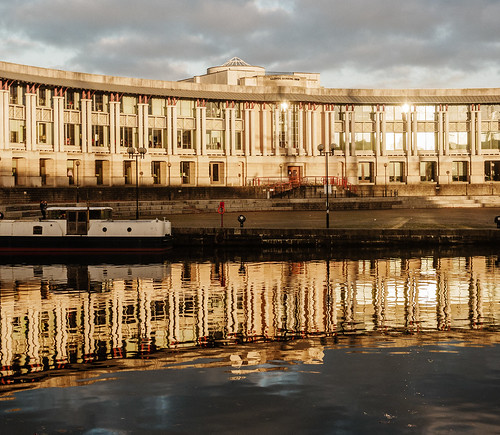Here are some excerpts from the excerpt, but I hope you’ll buy the book, too. It’s got a lot of new material, particularly about the economic ideas of the right. And a long, long chapter on Trump and Trumpism.
IN THE ART OF THE DEAL, Donald Trump tells us — twice — that he doesn’t do lunch. By the end of the first hundred pages, he’s gone out to lunch three times. Trump claims that he doesn’t take architecture critics seriously. On the next page, he admits, “I’m not going to kid you: it’s also nice to get good reviews.” Trump says the Wharton School at the University of Pennsylvania is “the place to go” to become a great entrepreneur. In the next paragraph, he states that a Wharton degree “doesn’t prove very much.”
Inconsistency has long been Trump’s style. But while his critics seize on that inconsistency as a unique liability, yet another difference between him and his respectable predecessors on the right, a happy avowal of contradiction has been a feature of the conservative tradition since the beginning. Originally, that avowal assumed a tonier form,…
…
The consonance between Trump’s inconsistency and the right’s embrace of contradiction raises a deeper question: Is Trump really a conservative? For many of his critics, on the left and the right, the answer is no. Trump’s racism, irregularity, and populism, and the ambient violence that trails his entourage, are seen as symptoms of a novel disease on the right, a sign that Trump has broken with the traditions and beliefs that once nourished the movement. Yet while the racism of the Trumpist right is nastier than that of its most recent predecessors, it is certainly not nastier or more violent than the movement’s battle against civil rights in the 1960s and ’70s, in the courts, legislatures, and streets. The weaponization of racism and nativism under Trump intensifies a well-established tradition on the right, as studies of American conservatism from the 1920s through the Tea Party have shown. Likewise, the erratic nature of Trump’s White House, the freewheeling disregard of norms and rules, reflects a long-standing conservative animus to the customary and the conventional, as do Trump’s jabs against the establishment. There are important innovations in Trump’s populist appeals, but populism has been a critical element of the right from its inception.
In other words, conservatives have breached norms, flouted decorum, assailed elites, and shattered orthodoxy throughout the ages. Still, Trump does represent something new.
…
Yet there is an unexpected sigh of emptiness, even boredom, at the end of Trump’s celebration of economic combat: “If you ask me exactly what the deals I’m about to describe all add up to in the end, I’m not sure I have a very good answer.” In fact, he has no answer at all. He says hopefully, “I’ve had a very good time making them,” and wonders wistfully, “If it can’t be fun, what’s the point?” But the quest for fun is all he has to offer — a dispiriting narrowness that Max Weber anticipated more than a century ago when he wrote that “in the United States, the pursuit of wealth, stripped of its religious and ethical meaning, tends to become associated with purely mundane passions, which often actually give it the character of sport.” Ronald Reagan could marvel, “You know, there really is something magic about the marketplace when it’s free to operate. As the song says, ‘This could be the start of something big.’” But there is no magic in Trump’s market. Everything — save those buttery leather pants — is a bore.
That admission affords Trump considerable freedom to say things about the moral emptiness of the market that no credible aspirant to the Oval Office from the right could.
…
This is what makes Trump’s economic philosophy, such as it is, so peculiar and of its moment. An older generation of economic Darwinists, from William Graham Sumner to Ayn Rand, believed without reservation in the secular miracle of the market. It wasn’t just the contest that was glorious; the outcome was, too. That conviction burned in them like a holy fire. Trump, by contrast, subscribes and unsubscribes to that vision. The market is a moment of truth — and an eternity of lies. It reveals; it hides. It is everything; it is nothing. Rand grounded her vision of capitalism in A is A; Trump grounds his in A is not A.
TRUMP IS BY NO MEANSÂ the first man of the right to reach that conclusion about capitalism, though he may be the first President to do so, at least since Teddy Roosevelt. A great many neoconservatives found themselves stranded on the same beach after the end of the cold war, as had many conservatives before that. But they always found a redeeming vision in the state. Not the welfare state or the “nanny state,” but the State of high politics, national greatness, imperial leadership, and war; the state of Churchill and Bismarck. Given the menace of Trump’s rhetoric, his fetish for pomp and love of grandeur, this state, too, would seem the natural terminus of his predilections. As his adviser Steve Bannon has said, “A country’s more than an economy. We’re a civic society.” Yet on closer inspection, Trump’s vision of the state looks less like the State than the deals he’s not sure add up to much.
…
I’ll be doing a bunch of interviews about the book, including one with our very own Henry, so keep an eye out at my blog for more information on that.
. Clerihews were invented by EC (Edward Clerihew) Bentley (author of Trent’s Last Case
, one of the greatest detective novels to be written by someone who wrote only one detective novel). [1] They have a strict format: they must be about a person who is reasonably well known, 4 lines, with an AA BB rhyming scheme. They also seem to observe other unstated criteria. They are not cruel, or didactic, and the person about whom they are written must have some sort of substance. Gavin Ewart points out in his introduction to The Collected that they could be used for biting satire but Bentley never does that and he (Ewart) is unaware of them ever being used so. They are gentle. The pay-off would ideally come as something of a surprise, but not be completely irrelevant: Surrealism and whimsy are permitted, indeed encouraged. The name of the subject usually (but not always) comes at the end of the first line, challenging the author to find a good, but non-obvious, rhyme (as you’ll see in a moment he rhymes Plato with potato which is only one part of the genius of my favourite clerihew). There are no rules about rhythm except, as far as I can tell, that if you write several, you should vary the meter. (All Bentley’s clerihews seem to have been illustrated by GK Chesterton: I can’t rival that!).
 Global coal production (source IEA)
Global coal production (source IEA)

